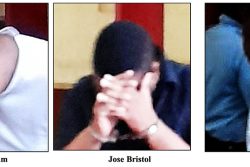In the last few years, Shai Hope has been one of the outstanding batsmen in One Day Internationals, but in Test cricket, his batting has been way below accepted international standards.
Earlier this week, I listened to what some experts on a Barbados radio programme had to say about his problems, and the steps that are needed to resolve them. The consensus was that he is a ‘great’ talent, not just a promising talent, that his problem is mainly a technical one, and that to turn his game around, he should accompany the team to New Zealand. There, he would be under the supervision and guidance of our best coaches. But, I asked myself, “Didn’t he just spend the last two years in the presence of our best coaches?”
During the programme, two thoughts immediately came to mind. The first was an African saying: “When a man falls, look at where he slips not where he falls.” According to those experts, technique is where Hope is falling down, but where is he slipping? The answer to that question might very well reveal the cause of his batting problems.
The second thought came from Buddhist monks in Sri Lanka years ago when I worked with the Sri Lanka team. In life you must solve your own problems. You have to engage in inner conversation and understanding of your will, desires and mind power. Play with your thoughts and contemplate. You don’t need great assistance from anyone else because the answers already lie within you, in your heart and mind.
Jacques Kallis, an all-rounder second only to Sir Garfield Sobers, is a strong believer in self-responsibility and self-awareness. He once told me that he thought today’s players were too dependent on their coaches and that the coaches weren’t doing enough to dampen that dependence. He feels that the players need to be more self-reliant; to think for themselves; to stand on their own feet; and to rely more and more on their own judgement and opinions and less and less on those of other people. He added that the batsman must be able to think for himself when he is in the middle. If he can’t, particularly in today’s highly competitive environment, he won’t play well. He complained that today when a batsman has a problem, instead of trying to work it out for himself he often prefers to go to the coach or the analyst to get an answer.
I think that the experts on the radio programme were overestimating the importance of Shai Hope’s talent in performance. Talent is just an indicator of potential. It does not guarantee success nor does it guarantee that the player will do the right things to play well. Motivation, on the other hand, indicates why the player might do the right things and how likely he is to do them. Some experts now claim that the correlation between self-motivation/self-discipline and success is much greater than the correlation between ability and success. They say that the depth of a player’s motivation and discipline usually determines the level of his success.
Regarding ‘great’ talent, an Australian Rules football coach once told his team of talented players: “Don’t talk to me about talent. Nobody has a right to be proud of natural ability. It came from your father and mother; you did nothing to earn it. It is only what you do with the four letter word ‘work’ that is a legitimate cause for pride.” To the word ‘work’ I would add discipline and motivation.
Shai Hope is in a performance slump. So what do some of the great champions say about slumps?
Sir Garfield Sobers said that when you are in a slump your thought patterns change, you doubt yourself, and you make your job harder than it really is. You often become anxious and confused and you don’t use your common sense to deal effectively with the challenges and demands in the situations you face.
He stressed that slumps may be started by something physical or technical, but in the end the real cause is poor mental functioning. He said: “There is no doubt about that. When you fiddle around with technique it often makes matters worse. Believe me, you don’t often find the cause or the solution in the body. You must look to the mind, in particular your thinking and concentration. Only after you have done this should you look at different areas. You must play your own style of game. If you try to make drastic changes and start doing things that you are not used to, you might make matters worse. In the end you have to go back to the basics of your game and try to execute them to the best of your ability.”
Ian Chappell one of Australia’s greatest captains once told me: “Your confidence and concentration are messed up when you are in a slump. Players in this state always do a thorough analysis of the physical aspects of their game. They examine their technique very carefully and pick it apart bit by bit. The people around them offer all sorts of advice and often suggest that they change important aspects of their game that worked well for them in the past. Players must learn to protect themselves from that type of advice and interference. In those players who have a reasonable history of success, a slump is always due to poor mental functioning rather than to any great technical problems.”
Shai Hope would do well to pay attention to the words and advice of these two great players. He should also contemplate the wise words of former India Test player VVS Laxman: “Learning and improvement should be a continuous process and until you play your last game in professional sport, you should always be trying to learn and improve all aspects of your game, not just your physical skill but also your temperament.”
When I encounter players and coaches with rigid beliefs, attitudes and approaches that border on arrogance and an unwillingness to change or learn, I usually inform them of an old Jewish adage that says: “When you are sure that you are absolutely right about something or about doing the right things, you should immediately search for a second and third alternative.”
I also tell them the following story. A student went to a Zen master to learn about Zen but instead of asking questions and listening to the master, he proceeded to show him how much he knew by giving him a lecture. The master listened attentively and after a while offered the student a cup of tea. When the tea arrived the master started to pour it into the student’s cup. He kept on pouring until it started overflowing on the table and the floor. The student could not contain himself and screamed, “Stop pouring! The cup is full; no more will go in.” The master stopped and replied, “Just like the cup your mind is full of your own beliefs, ideas and prejudices. How can you learn unless you first empty your cup?”
The West Indies selectors’ decision to omit Shai Hope from the tour to New Zealand is the right one. He must now take full responsibility for the revival of his own game. The secret of his success already lies within him. He should become more self-reliant and work to develop his own system of success. He can change his path and trajectory in cricket by altering the things he believes, values and pictures in his mind. The thoughts, images and values that he imprints in his mind today will determine what he achieves and becomes tomorrow. That could involve becoming a champion batsman.






